Let’s get started with the Chuck Russom Special! Today I have for you an interesting interview I had with him, talking about general aspects of his career, his tools, thoughts on the industry, and more.
Designing Sound: To start please tell us how you get started with sound and the evolution of your career..
Chuck Russom: Growing up as a musician, I went into college knowing that I had to choose a career that had something to do with music. Nothing else interested me. I soon realized that I hated music theory and other elements of an “academic” musical education. I just wanted to play music and school was turning my art into science. And frankly, I was just not that good at my instruments (drums and guitar) to consider myself a professional. In my search to find some sort of music career I could fit into, I enrolled in a music business class. In the class we learned about various non-musician careers in the music industry. I got really interested in recording engineering and producing.
I ended up leaving school to find my own way into engineering. I started reading all the recording magazines, learning about equipment, and experimenting on my own. This was during the time when DAW’s were just starting to come out. I was fascinated with Nine Inch Nails Downward Spiral album. I’d never heard sounds like that before. I read this articles about how Trent Reznor used computers, samplers, and Protools to make his music. I really wanted to get my music into the computer to see what I could do with it, so I got a copy of Sound Forge. I also owned a Fostex 4 track cassette recorder and a Shure SM58 microphone. I’d record things onto the 4 track, transfer them into Sound Forge and learn how to edit and process my music. I was really just messing around, but it was a good learning experience.
I decided to seek out an internship at a recording studio so that I could learn how sessions were run. I answered an ad in a local music magazine and took an internship at a local studio run by Rob King. At the time, in addition to writing, producing, remixing, and recording music, Rob was working as an Audio Director for New World Computing, working on the Might and Magic franchise. That was my first exposure to game audio, which is something I never even realized existed. I remember spending time in his studio; doing office errands, while listening to him make swords and other fantasy sounds.
I interned there a short time, and then ended up taking a job at Guitar Center. As much as working in music retail sucked, it had its perks. I was selling recording equipment, which meant that when we were not busy, I got to play around with the gear and learn to use equipment that I couldn’t afford to buy myself. We also got great discounts, so that made it easier to start building my home studio.
One day I got a call from Rob King. “You know Sound Forge, right?” “Uh, yeah, I guess….” Rob was looking for a sound designer to work at New World Computing. He took a chance on me and hired me for the gig. He gave me my break. I worked at New World for a few years as a sound designer on the Might and Magic franchise.
After New World, I went to work at Infinity Ward, where I was the sound designer on the original Call of Duty game. Working on Call of Duty opened a lot of doors for me. I received an offer from EA to lead the audio on Medal of Honor: Pacific Assault. When Pacific Assault was finishing up, I got an offer from Sony to work on a new IP called God of War.
After 2 and half years at Sony working on the God of War franchise and various other Sony titles. I heard that Activision got the license to make James Bond games. I am a huge Bond fan, so I did a little research and found out that Treyarch would be making the first Bond game. Treyarch was based in LA, where I live, so I used my connections to get my resume to the right people and was able to get an offer to lead the audio on Quantum of Solace. After shipping the Bond game and working in-house for 10 years, I needed to try something different. In 2008 I decided to start working as a freelance sound designer and recordist.
DS: What are the advantages of working as freelancer? How you survive to the “crunch” from a freelance position?
CR: One of my favorite parts about being freelance is the variety of projects that I get to work on. When I worked in-house, I would spend years on the same project and was not able to work on anything else. The plus side of in-house was that I was much more integrated into the project, had a much larger role, and worked on the project for a longer time. But there would be projects that would come up that I would have loved to work on, but couldn’t take on.
As a freelancer working in games, you are often brought on late in the project. Usually to help fix a specific area of the audio or just to help get the project finished; since the audio team is often overloaded and out of time. I get a lot of calls to help out on weapons for various games. Most of the projects are for short durations, focusing on a very specific set of tasks. Instead of working on a game for years, I may spend as little as a few weeks on a project. The great thing is that I get to work on a diverse style of projects. There was one point last year where I finished up designing gun sounds for the new Medal of Honor one day and found myself designing sounds for Dante’s Inferno the very next day. Quite a switch!
We work in creative industries, and crunch is always going to be there. When I worked in-house, there were projects that I would spend months working late nights and weekends. As a freelancer, I have a little more control of my working hours. But at the end of the day, the project needs to get done, the sound needs to be great, and the client needs to be happy. So you have to do what it takes to get to that point.
To survive in a creative industry, I really feel that you need to be smart with your scheduling. You have to be very careful not to underestimate the time it will take to get the job done. Often you can tell which projects are going to be nightmare crunch projects. You have to decide if they are worth taking on. Sometimes a project is just not worth the stress. You have to look at it on a creative and a business level. Is this going to be a fun project that I can explore some creative sound design on? Am I allowed enough time and resources to do great work? Is this a project that will help my portfolio? Is there a decent financial payoff to the amount of work and stress this project will have? If I do this massive crunch period, will I have enough of a break to rest and recover before the next project?
Try to not schedule yourself so that you jump from one crunch to the next. You can’t be creative and do your best work if you are constantly burned out. You have to schedule some sort of break. Between 2003 and 2007, I was pretty much in a constant crunch. During that time I worked in-house at 3 different game studios (Infinity Ward, EA Los Angeles, and Sony Santa Monica). I also shipped 4 massive games (Call of Duty, Medal of Honor: Pacific Assault, God of War, and God of War 2). I remember having pockets of downtime here and there. I filled the downtime with massive personal events like buying and renovating a house and having a child. Those few years nearly killed me! I learned that you just cannot function at that pace forever.
When you are working on a project, you have to know your limits and learn to pace yourself. It’s easy to get excited by something new and start putting in extra hours at the start. While it may seem like you are getting a head start, it rarely works that way. Things will always get crazier and more intense as the project moves on. If you don’t pace yourself for the long haul, you are just going to burn yourself out early and risk doing work that is not your best. The more you burn yourself out, the more your health, your work, and you family life will suffer. You have to know your limits and know when to slow down or take a break.
DS: You’ve worked in different video games. What has been the biggest challenge in those projects?
CR: Every project presents its own unique challenges. I think back to when I worked on the original Call of Duty game. The biggest challenge for me at the time was delivering the level of quality that the project required, while dealing with my own inexperience in the genre. I had been working only on fantasy games to that point and then suddenly I had to switch gears and do all these weapon and realistic war sounds and at the same time it had to be the best sounding game. The producers on the project would accept no less than “award-winning audio”. It was tough!
On the God of War games, I think the biggest challenge was working with such an intense game team. They are some of the best in the industry and it was great to be a part of that. They are very creative and focused on delivering quality games. And that can lead to a bit of chaos as ideas are tried out, tossed away, and then re-tried. The team is very dedicated to delivering only the best quality games, and they are willing to put in as much work and as many hours as needed to get it done. And they will make changes and tweaks up until the final minute. It was awesome to be part of that franchise, but very challenging working in such an intense environment day after day.
With Quantum of Solace, to me the biggest challenge was that it is a franchise with over 40 years of history. Everyone has seen a Bond film or played a Bond game. Everyone can whistle the Bond theme. And I am a huge, life-long fan. The music had to be perfect and feel like it fit in the Bond world. The dialog and the actors we worked with had to be right. The sound effects had to be Hollywood blockbuster style.
I pushed for a huge budget for field recordings. We did days of guns, explosions, dropping cars and Foley. And that was in addition to the day-to-day guerilla recordings we did. We spent weeks in Europe chasing down the key actors from both the Quantum of Solace and Casino Royale films. And that was in addition to the weeks of recordings that we did in LA for the non-movie characters. We recorded the brass section for our score at Capital Records in Hollywood with some of the best players in the world. There were a lot of battles over budgets and a lot of work convincing producers to spend the money, and it was all very tiring to make happen, but it turned out awesome and it was worth it!
DS: How has been your relationship with developers and directors of the video games you’ve worked on? Any interesting stirs on specific titles?
CR: When I worked in house at the various game studios, I worked very closely with the development teams and game directors. I’ve always had a great relationship with the teams I’ve been a part of. When you work with other creative people, there are always going to be times when you don’t all agree and you can get into heated debates at times. I never take my work personally and know that my sound is there to support the overall vision of the project.
The director on the first God of War was Dave Jaffe. If you don’t know who Dave is, search the web and I’m sure you can find all sorts of interesting stories, or some of his opinionated blog posts! My favorite thing that I ever heard Dave say is, “I don’t come to work to make friends.” And its true! The thing about Dave Jaffe is that he has a lot of ideas and is creative person. He just wants his project to be right. He is the type of director who will know what he wants when he sees/hears/plays it, but he has difficulty communicating what he wants. Often the best feedback he can offer are notes like “this sound sucks”, “change this”, “you’ve got to be kidding me”, “what the hell is this”. All you can really do is keep trying things and hope that you can get closer to his vision.
As difficult as it can be to work with someone like that, I give Dave all the credit in the world. The first God of War game was very much a team effort, but I credit the high quality of the game to Dave Jaffe’s constant push and demanding the absolute best out of everyone on the development team. I remember people telling me that they would be so pissed with Dave that they would go back and pump out their best work ever, probably just to shut him up! And most of the time, he was right, and the stuff probably wasn’t the best the first time.
Since going freelance, I tend to get hired by audio directors or the audio team on the project, so I’ll have little (if any) interaction with the director or game team. I’ve been lucky to have worked with people who value my creative input and trust my abilities. I know that I am helping others with their vision, so no matter how great I feel something is, if the client isn’t happy with it, then I can’t be happy with it.
DS: If you have to give only one advice to a sound designer (both young and experienced) what would you say?
CS: Loose the ego. Do great work and take pride in it, but don’t be arrogant about how great you think you are. Remember that audio is there to support the overall vision of the project. There are a lot of great sound designers out there. If you are difficult to work with, you can easily be replaced. Its important not to be so attached to your work that you can’t see the flaws in it. If the director or producer isn’t happy with your work, even if you think the work is perfect, it is their project and you need to support their needs. If you can’t handle criticism, then you are in the wrong line of work.
DS: You’re very active in social networks such as Twitter, Facebook, Buzz, etc… How that networking tools has helped you on your career?
CR: As a sound designer, it is really easy to lock yourself in a dark room and just listen to loud sounds all day. At the same time forgetting that there is a whole world out there you may be missing. The social networks, especially Twitter, have really helped me connect to the sound community. It’s been very inspiring to follow other audio pros, read their blogs, and find all the cool new sound design websites. I think I had lost touch with all of that for a while, I’d been too focused on my own work to see what else is going on out there. There has been an explosion of new sound design blogs and websites. It’s really inspiring to see so many people sharing ideas and recordings.
Facebook started for me as a place to stay connected with friends and family. I see it as very different than Twitter. It’s not about my work and I don’t use it to meet or connect with new people. I’m very selective about the people that I will connect with on Facebook. More and more, I was getting Facebook friend requests from people who were interested in following me as a sound designer. So I set up a public Facebook “fan” page for those people that are looking to connect with me. That page is all about my sound work.
I’ve been disappointed in how slow Google Buzz has been to take off. To me, it seems like a great extension of Twitter. I would much rather use Buzz than my Facebook page. It’s a great platform to share cool articles, videos, and info you find on the web. I jumped on to Buzz at the beginning, but I don’t know if it will really ever take off like Facebook and Twitter have.
Of all the social networks, Twitter is the most important to me. I find it is a great place to share my thoughts, get news and information, and connect with a lot of cool people. I probably spend way too much time on it though!
DS: When do you find your inspiration? Is there any influence or something that helps on your creativity?
CR: I find a big influence on creativity is an approaching deadline. Nothing motivates you like a ticking clock. I find that I often do my best work with a deadline looming. When you have a lot of time to work on something, it is really easy to get sidetracked and loose sight of what is important. It’s can be difficult to commit to an idea, because you still have time to change your mind. When the end is in sight, you need intense focus. There is no time to loose sight of the goal.
DS: What are your favorite/main tools for sound design?
CR: For software, Sound Forge is the one program I just can’t replace, no matter how hard I try. It was the first audio editing software I ever used, and I can’t get away from it. I use it to master my recordings, master game assets, and for quick editing jobs. For my DAW, I’ve moved from Protools to Nuendo (and could easily move back), but nothing can replace Sound Forge, I’ve tried.
For plugins I mostly use Waves, I have everything they make. They are a big part of work that I do. I also use GRM Tools when I need to some craziness. Audio Ease’s Speakerphone is another favorite.
Basehead is my favorite tool for sound library management. I’ve been spending a lot of time lately getting all of my old recordings injected with metadata and cataloged into Basehead. It is a world of difference when you sounds are properly edited and cataloged.
My absolute favorite tools are my microphones and field recorders. I have 3 recorders; my main unit is a Sound Devices 744T. I also have a Fostex FR2 that I’ve had for several years and keep around because it works great for guns and things with a lot of impact. My third recorder is a small Sony PCM-M10 that is nice because it is about the size of an IPod; it’s easy to carry around on you all the time. For the last 5 or 6 years I’ve been recording everything at 24bit 96K, but lately I’ve moved to recording most things at 24 bit 192K.
My favorite microphones are my Neumann RSM191 stereo shotgun and my Sennheiser MKH mics, of which I have 4 (416, MKH40, and 2 MKH800’s). I have a lot of mics; they are my one gear addiction! Most of the time though, I’m use the Neumann or one of the Sennheisers.
DS: What do you do when you’re working on an specific sound/sequence and you realize that it isn’t working?
CR: When I find that I’ve hit a wall, the first thing I do is to stop working and walk away. Sometimes just going for a walk outside is enough to get you back in the right mindset. If you give yourself some distance from the problem, you can probably think things through and figure out some solutions.
If a break isn’t enough to get me going, I’ll look for sources of inspiration. I’ll try to think of some movies that have similar sounds to the ones I’m trying to create. I’ll watch a couple scenes from a movie, dissect the sounds, and see if that gets me back on track. Sometimes just listening to music is enough to get me inspired. The important thing is to just get away from the work and try to get inspired to try something new.
10. And what about the film industry? Would you like to work there some day or you’re only for the games? Why you love to do sound for video games?I love working in games. Game audio is evolving constantly and there is always room to do something that no one has ever seen, to push the envelope. When I first got started in games, I approached it as something to do until I could make the jump into music or film. I think that once I finished Call of Duty, I really saw the potential of game audio. It’s an exciting field to be in because the quality and creativity we can produce just keeps getting better and better.
As for film, we’ll have to see what the future holds. I’d love the chance to work in film and other mediums. The main thing for me is to find projects that interesting and challenging, regardless of the medium.
DS: In terms of sound what are the limitations you found in the actual generation? Is there something special that you would you like to see in the next-gen platforms?
CR: The classic answer to these questions has always been to say we need more memory. But, I think we are beyond that. You are never going to have enough memory on game systems to do everything you want to do. With each new generation or platform you get more memory. But at the same time the games get bigger and need more sound! I think most of us have figured out to create great audio and work with memory limitations.
What I want to see is for the tools to continue to evolve. So many teams are still making games with old or obsolete tools. I want to see tools that work the way audio people think. We shouldn’t have to be programmers to create and implement game audio. Tools are getting better, but there is still a lot of room for progress. In-game mixing, for the most part, is still way behind. It is hard enough to get a great audio mix in a game, but without the proper mixing tools, it is nearly impossible. With hundreds of channels of sounds playing in today’s games, mixing is so important and so often overlooked.
DS: Finally… what are your challenges for the future? What’s coming next?
CR: How do I stay relevant? It’s something I think about. The technology we work with, both in our audio tools and game technology is constantly changing. It is challenging, but necessary, to stay on top of it. I don’t want to be that guy so stuck in his ways that I miss progress. I’d don’t want to be that old timer talking about how we used to do things back in the PS2 days
In January I launched my sound recording blog (chuckrussom.com/blog.php). It has really motivated me to record more often. I recorded more new sounds in January and February of this year, than I did all of last year. I’m always looking for new sounds because I have this constant place to share them. The more popular the blog gets, the more I push myself to find sounds that I feel will be the most interesting to the readers. I sometimes find myself recording something exclusively for the blog. Stuff that I normally wouldn’t chase down, but I think that it could make a good post, so I spend the time and go after it. It becomes difficult to balance the blog with other work stuff, but it has become something that is really important to me and I plan to keep growing it. I’m always thinking of new ideas and always driving myself further. I have ideas of how I can improve and extend the blog. In the coming months there are some new things that I’m going to try out that I think will take it to the next level.
I keep exploring new ways to challenge myself. Always looking for new ideas to explore. One night I was uploading some photos to Flickr and I was thinking how cool it would be if there was a group where people could share photos of their sound recording experiences. I know I’d love to see that. So I started up a group (flickr.com/groups/soundeffectsrecording). It’s been cool to see that grow into its own thing with the members posting their pictures. It’s still small, but I’m hoping will continue to grow. I really love the community aspect of it. I started the group and was then able to sit back and watch the members make it what it is. I’m looking at ways to incorporate that aspect of community into the blog.
If that wasn’t enough, I decided a while back that I am going to launch my own sound effects label, Chuck Russom FX (chuckrussomfx.com). Featuring my recordings, offered as smaller-focused sound collections, downloadable, at reasonable prices. I’m not really interested in offering huge, expensive, general sfx collections. I just want to be able to offer things that I record, grouped into collections that make sense. I got a little excited and got ahead of myself, and probably started talking about this on Twitter a little too early. I’m still sorting out details and trying to find the time to properly launch this, but I’m hoping it will be soon. I’m currently targeting May for the first releases.
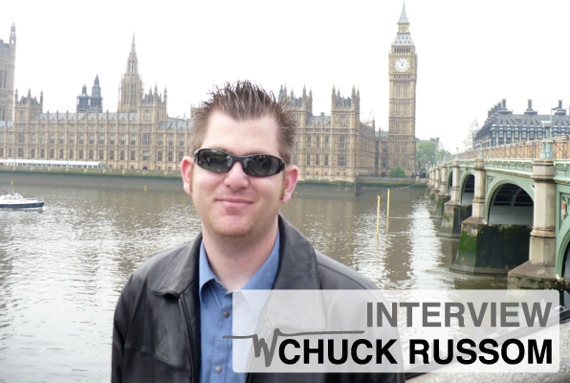
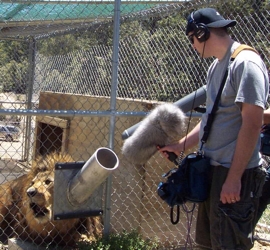
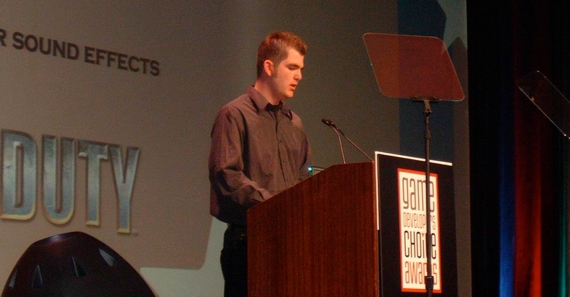
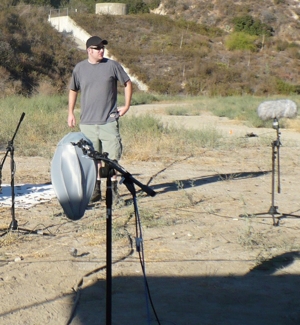
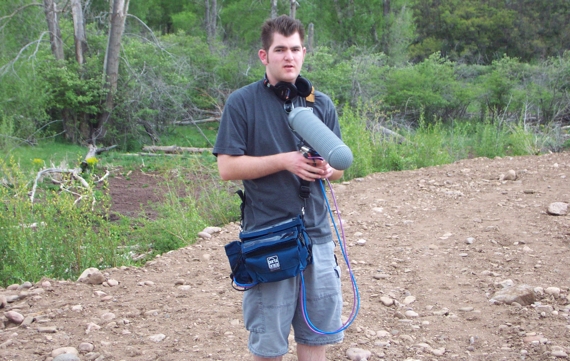
Great interview and sage advice from a guy who knows!
(and one’s who’s humble enough not to shake it in your face)
“What I want to see is for the tools to continue to evolve. So many teams are still making games with old or obsolete tools. I want to see tools that work the way audio people think. We shouldn’t have to be programmers to create and implement game audio.”
I second that emotion!
One of the biggest barriers between classic sound design and interactive is the creativity enabled by the tool’s or processes used in implementation. That’s not to say that every feature has to have a shiny button, but there has to be enough flexibility to allow sound designers to fully realize their sounds within the game space without handing over that responsibility to someone outside of the audio team.
Looking forward to the articles, bring em on!
-lcl